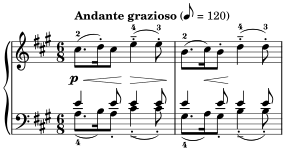Tempo facts for kids
"Beats per minute" redirects here. For the rate of heart beats, see Heart rate.

This music by Wolfgang Amadeus Mozart shows "Andante grazioso" for its tempo. This means "at a walking pace, gracefully."
Tempo is an Italian word that means 'time' or 'movement'. In music, tempo is simply the speed of a song or piece of music. It tells musicians how fast or slow to play.
How Fast is That?
Musicians use special words, mostly from Italian, to describe how fast a piece of music should be. They also use a tool called a metronome to measure tempo in BPM (beats per minute). This tells you exactly how many beats happen in one minute.
Here are some common tempo markings, from slowest to fastest:
- Larghissimo – Super, super slow (24 BPM and under)
- Grave – Slow and serious (25–45 BPM)
- Lento – Very slow (40–60 BPM)
- Largo – Slowly and broadly (45–50 BPM)
- Larghetto – A bit faster than Largo (60–69 BPM)
- Adagio – Slow and calm (66–76 BPM)
- Andante – At a walking pace (76–108 BPM)
- Moderato – At a medium speed (98–112 BPM)
- Allegro – Fast, quick, and bright (120–156 BPM)
- Vivace – Lively and fast (156–176 BPM)
- Presto – Very, very fast (168–200 BPM)
- Prestissimo – Extremely fast, even faster than Presto (200 BPM and over)
Changing the Speed
Sometimes, the speed of a song changes as you play. Here are words that tell you to change the tempo:
- Ritardando – Slow down little by little.
- Ritenuto – Slow down suddenly.
- Accelerando – Speed up gradually.
Other Tempo Words
Composers also use other Italian words to give more details about the tempo:
- A tempo – Go back to the original speed.
- L'istesso tempo or Lo stesso tempo – Keep the same speed.
- Tempo comodo – Play at a comfortable, easy speed.
- Tempo di... – Play at the speed of a certain dance or style. For example, Tempo di valse means "at the speed of a waltz."
- Assai – Means "very much." So, allegro assai means "very fast."
- Con – Means "with."
- Con brio – With energy and spirit.
- Con moto – With motion.
- Meno – Means "less." So, meno mosso means "less quickly."
- Molto – Means "much" or "very." So, molto allegro means "very quick."
- Non troppo – Means "not too much." So, allegro non troppo means "fast, but not too much."
- Più – Means "more." So, più allegro means "more quickly."
- Poco – Means "a little." So, Poco adagio means "a little slow."
- Poco a poco – Means "little by little."
- Senza – Means "without." So, senza tempo means "without a strict tempo."
- Subito – Means "suddenly."
Images for kids
See also
 In Spanish: Tempo para niños
In Spanish: Tempo para niños
Black History Month on Kiddle
African-American female entrepreneurs
 | Madam C. J. Walker |
 | Janet Emerson Bashen |
 | Annie Turnbo Malone |
 | Maggie L. Walker |

All content from Kiddle encyclopedia articles (including the article images and facts) can be freely used under Attribution-ShareAlike license, unless stated otherwise. Cite this article:
Tempo Facts for Kids. Kiddle Encyclopedia.

